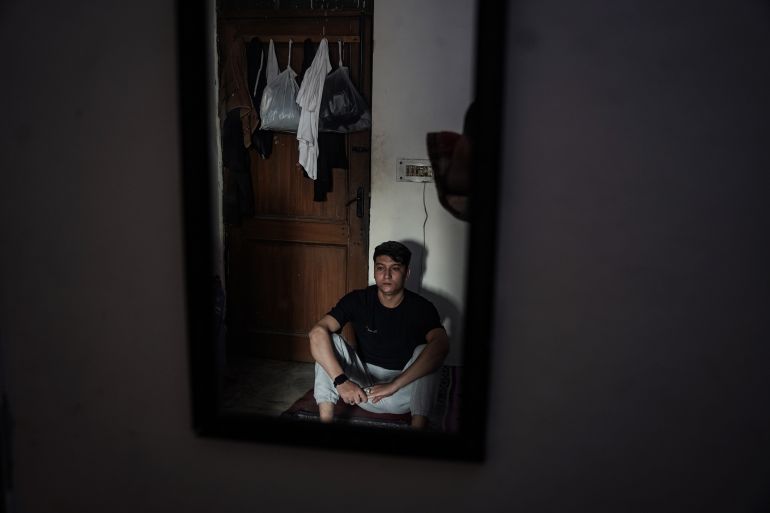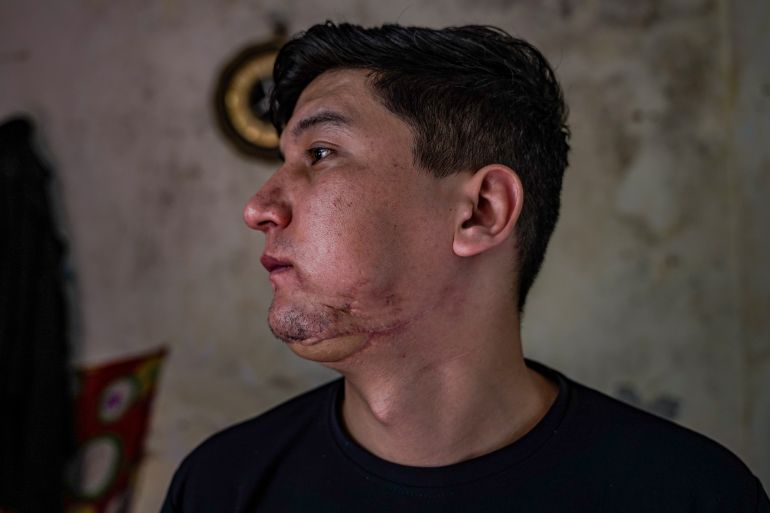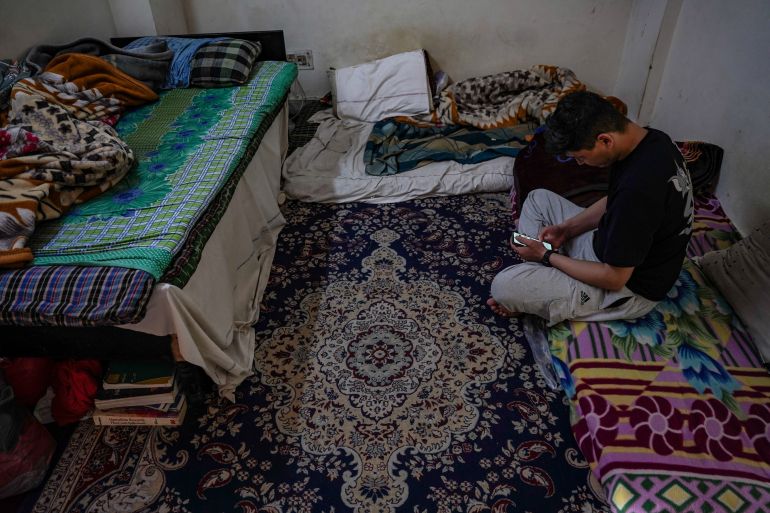Interview with Alexander Jones, Director of the FAO’s Resource Mobilization Division, on his recent field visit to Afghanistan to see how FAO is helping farmers to get back on their feet
m.jpg?sfvrsn=ddaedf39_3)
Alexander Jones, FAO’s director of resource mobilization, and FAO Afghanistan representative, are visiting a group of wheat farmer at Daman district of Kandahar to learn about the challenges that they are facing in agriculture, Afghanistan, February 2024.
©FAO
Rome – Afghanistan is the Food and Agriculture Organization of the United Nation’s (FAO) single largest country programme, where it continues to carry out its operations despite the ongoing political instability. The Organization has over 400 employees on the ground and is present in every one of the 34 provinces in the country.
The food security situation remains alarming with over 15 million people or 36 percent of the population being food insecure. However, the work that FAO has been doing there with other partners— having reached over 10 million farmers last year and intending to reach more this coming year with wheat seed, animal vaccines, and other agricultural production inputs— is contributing to the gradual reduction in the food insecurity numbers. These interventions play a vital role since 80 percent of the country’s population derive their income from agriculture.
Alexander Jones spoke with us on his return from a field visit to Afghanistan, where he met with rural farming communities and pastoralists. In this interview, he sheds light on the current challenges members of these communities are facing, how the climate crisis is affecting them, their priority needs and ways to stabilise the situation. He also speaks about concrete projects on the ground and what difference they are making in rural people’s lives, while sharing his thoughts and observations on how the country has changed over the years.
You visited rural farming communities in three provinces: Kapisa, Kandahar and Helmand. What is the current food security situation there and what are the biggest challenges faced by Afghani farmers and pastoralists at the moment?
Alexander Jones: The food situation has improved compared to a year or two years ago, but it is still quite dire. There is a loss of income, there are problems with migration, a recent influx of returnees from Pakistan, and, of course, drought and climate change are affecting them very seriously. But things have improved substantially, also thanks to the huge job that the United Nations in general, and FAO specifically, has been doing over the last two years to support farmers. In short, improving, but a huge amount of work is still to be done.
Drought, water scarcity, rapidly descending ground water levels hit farmers and pastoralists the most, and rural people consequently suffer from these issues. How do climate change impacts affect the humanitarian situation in the country?
Climate change is particularly severe in terms of impacts in Afghanistan because it is a very arid country.
In addition, we have also had four consecutive years of drought. The expectation was that this year was going to be a really good one from a climatic perspective, because normally in El Niño years Afghanistan benefits. Instead, we have seen an inversion of the El Niño, followed by a horrendous drought situation. And this is affecting the whole country. Obviously, there is not a lot we can do about this in the short term. But, for example, FAO over the last two years has supported communities through cash-for-work programmes in building more than 6,000 check dams to support better water infiltration and a recharge of the groundwater.
And we also have a lot of plans to support farmers on improved on-farm water management because there is a lot of wastage due to the techniques they are using now.
You saw at firsthand how rural communities live and work there and what kind of support they need. Can you give a concrete example of how FAO is helping farmers to cope with water scarcity and mitigate crop losses?
It is a huge programme. In fact, this is the biggest programme FAO is implementing anywhere in the world, and we are also the largest programme being implemented in Afghanistan.
We are talking hundreds of millions of dollars. FAO, just in the last year, has supported over ten million people, so it is a vast scale. The most concrete example has been the supply of very high-quality wheat seed to boost farmers’ production accompanied by fertilizers and some other inputs.
This has been the quick fix I would say, and it has been spectacularly successful. We are already moving beyond that into some types of water management, mostly check dams, some water harvesting, and solar dryers to help farmers preserve fruit and vegetables for the winter season.
There is a lot of work going on including some specifically focused on women farmers and women farming families, who are in an extremely difficult situation due to the bans that prohibit them from accessing education beyond the age of 12, and place severe restrictions on their ability to work and engage in business. There are things like mushroom farming or horticulture – areas where they are allowed to work even under the very strict rules.
The food security situation has slightly improved, but there are still concerns about a large portion of the population – over 35 percent – being food insecure. In what ways is FAO addressing the food security issues?
The important point is that things have improved, but the crisis is definitely not over. Having stabilized the situation through a massive humanitarian programme, we do want to start moving into more longer-term food security issues. We are not at the point of talking about development, also given the political uncertainty. But there are many interventions we would like to get involved in.
Just one concrete example is that most Afghan farmers have tiny land allocations. We are talking 4,000 or 5,000 square meters. Two ”Jerib”, as they call it. That is really not enough to feed a family of 10 growing wheat. So the whole point is to try to move into higher value-added crops – such as pomegranates, grapes, apricots and all kinds of vegetables – of which they have very good knowledge, and which can be sold in markets.
But to do this, we would face several challenges relating to inputs, cold storage, markets, labelling, packaging, and so forth. It is a difficult step. But what is most interesting is that the farmers themselves are actually asking for these things. In every village meeting I sat down in, and I did 10, they were literally listing all these things: water management, solar drying, cold storage, and markets.
What you describe is a combination of emergency aid and anticipatory action to make farmers more resilient to multiple shocks they face. Can you elaborate on how important investing in anticipatory action is?
It is very important. The drought, the soil conditions, the lack of infrastructure, these are constant problems in Afghanistan and will remain that way for the foreseeable future.
We do need to look at more sustainable models for food security, anticipatory action in many areas including in livestock. FAO recently helped to control and suppress a massive outbreak of lumpy skin disease, which thankfully we managed to stop quickly. So, anticipatory action remains fundamental, but it requires a continued availability of resources.
What struck you the most during this trip?
I lived in Afghanistan 21 years ago, I had not been back to Kandahar since then. It was amazing to see some old friends, it was amazing to be back. It was striking how little had changed.
In 21 years, that was a bit disappointing. There are a few things that have changed radically, including the use of extensive solar pumping of groundwater for irrigation, which is now severely lowering water tables to the point where they are too deep for many communities. So, some things are better, some things are a bit worse as could be expected two decades later.
On a very positive note, it is possible to travel pretty much anywhere in Afghanistan now. Security has significantly improved, although FAO continues to operate under very high security protocols. So we have full access to the population. We have good cooperation with the de facto authorities, especially at the local level, although, of course, we operate separately and in parallel. But I do recognize that we are allowed to do what needs to be done. And there is a great humanitarian community there. Just to mention that 85 percent of our staff in Afghanistan are Afghans, and they are doing an amazing job.
 Afghanistan Peace Campaign
Afghanistan Peace Campaign








